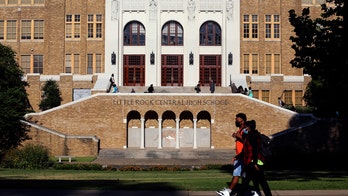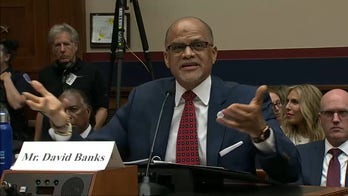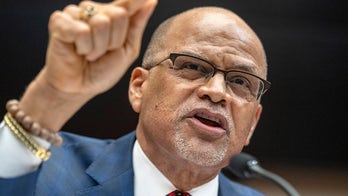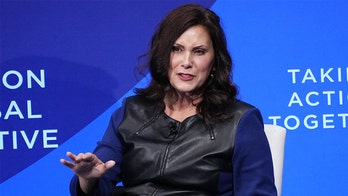The Supreme Court could hand President-elect Barack Obama a delicate problem in the coming days: What to do with a suspected al-Qaida sleeper agent who is the only person detained in this country as an enemy combatant?
Ali al-Marri has been held in virtual isolation in a Navy brig near Charleston, S.C., for nearly 5 1/2 years. He is challenging President Bush's authority to subject a legal resident of the United States to indefinite military detention without being charged or tried.
The justices are expected to consider al-Marri's case when they meet in private on Tuesday. If they agree to hear arguments, over the Bush administration's opposition, they could say so the same day.
Bush's legal team has claimed authority for such detentions and has argued aggressively for it in court papers.
But the case would not be scheduled for argument until sometime in the late winter or early spring, during Obama's first months in office.
Al-Marri's fate will wind up in Obama's hands in any event, but a decision by the court to hear his challenge would force the new president to confront the issue quickly.
In the event the dispute makes it as far as a court hearing, the new administration's lawyers would have to argue the same basic position urged by Bush's team, despite Obama's repeated criticism during the presidential campaign that Bush was too aggressive in asserting executive authority.
Or Obama's lawyers could reverse course in the middle of a complex legal dispute that would essentially have the new president arguing for limits on his powers.
Either way, "it will be a very tough position for the new administration," said Sharon Bradford Reynolds, senior counsel at The Constitution Project, a bipartisan legal think tank that wants the court to hear the case and rule for al-Marri.
But Obama would have other, potentially more palatable, options that would almost certainly head off a hearing in the Supreme Court.
He could send al-Marri home to Qatar or transfer him back to civilian court to face criminal charges. The government followed the latter path in the case of U.S. citizen Jose Padilla rather than have the high court take up the matter. Padilla, who was held in the same brig as al-Marri, was convicted in a criminal trial in federal court in Miami.
Brad Berenson, a former Bush administration lawyer who went to law school with Obama at Harvard, said the new president is likely to discover that al-Marri's case is not easily resolved.
It may be that trying a suspected al-Qaida agent in civilian court is difficult, although the government has successfully prosecuted Richard Reid and Zacarias Moussaoui since the Sept. 11 attacks.
"Al-Marri is one of those cases where the rhetorical necessities of the campaign are likely to collide with the security necessities of governing," Berenson said.
Obama's transition team has little to say about the case.
"We are not going to comment on cases pending before our courts. President-elect Obama has repeatedly said that he believes that our current legal framework has failed to successfully and swiftly prosecute terrorists," said Brooke Anderson, chief national security spokeswoman for the transition. "He will make decisions about how to handle detainees as president when his national security and legal teams are in place."
Obama also is weighing what to do with the roughly 250 men who are being held at the U.S. naval base at Guantanamo Bay, Cuba.
Al-Marri arrived in the U.S. with his wife and five children on Sept. 10, 2001 -- one day before the terrorist attacks in New York and Washington. He entered the country on a student visa seeking a master's degree in computer science from Bradley University, a small private school in Peoria, Ill.
He was arrested three months later as part of the FBI's investigation of the Sept. 11 attacks. Prosecutors indicted him on charges of credit card fraud and lying to the FBI, traditional criminal charges.
But in June 2003, Bush said al-Marri had vital information about terror plots, declared him an enemy combatant and ordered him transferred to military custody.
The government says al-Marri trained in al-Qaida camps, met with Osama bin Laden and Sept. 11 mastermind Khalid Sheikh Mohammed. His laptop was filled with information about poisons, coded e-mail messages and lectures by bin Laden and others on the importance of martyrdom, the government says.
Regardless of the problems al-Marri's case could pose for the new president, civil liberties groups want the high court to resolve the issue now. Without a Supreme Court ruling, a decision by the Richmond, Va.-based 4th U.S. Circuit Court of Appeals backing the president's authority to detain terrorism suspects in the U.S. without charges would remain on the books.
"We don't know what the Obama administration or any future administration would do," said Jonathan Hafetz, a lawyer for the American Civil Liberties Union who is representing al-Marri.
Aside from the dispute over the law, al-Marri has been imprisoned for seven years.
The conditions of his confinement at the Navy brig were initially so harsh, his lawyers said, that they feared for his mental health.
Guards weren't allowed to talk to him, or even look him in the eye. There were no visits, no phone calls, little to do but sit and wait for the next day to come.
"I don't know of any other inmate in the history of the United States ... that's been in isolation that long," said Andrew Savage, a South Carolina lawyer for al-Marri.
But in response to a lawsuit over the conditions, federal prosecutors in April revealed that several prison cells have been converted for al-Marri into areas for sleeping, living and studying, including a nearly 400-volume personal Islamic library. He has access to exercise machines and cable television, although news of U.S. military activities is censored.
Prosecutors have said giving al-Marri news about the war would allow the suspected al-Qaida associate to learn about any plans by bin Laden against the United States, an argument with which a federal judge has agreed.
Still, he has not seen his family in seven years, not even in pictures.
When al-Marri was arrested, the last of his five children had just been born. Now, that boy is 7 years old.
"He hasn't seen him. He hasn't touched him," Savage said.
The case is al-Marri v. Pucciarelli, 08-368.




